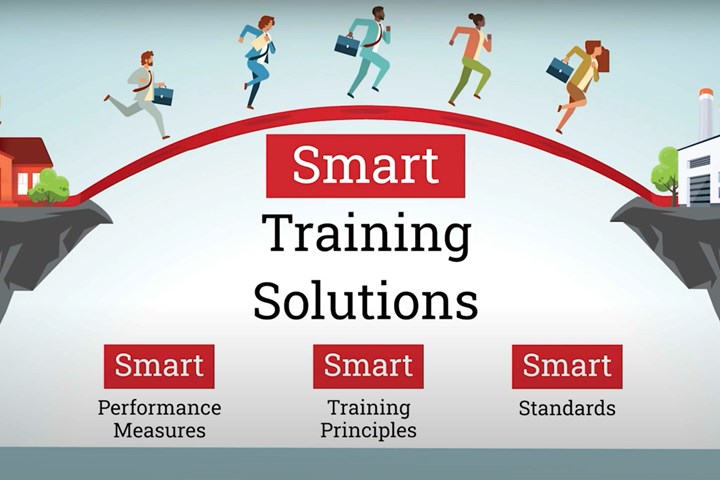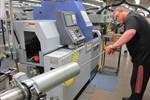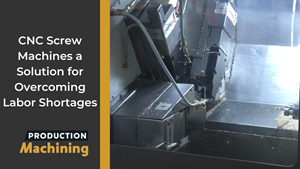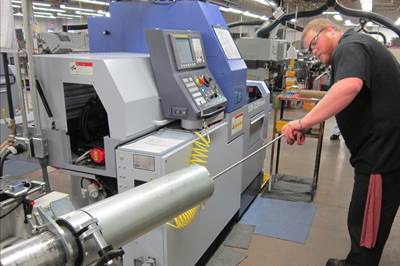Program Helps Shops Frame Training to Meet Their Needs
NIMS’ Smart Training Solutions is a framework for modernizing training to keep up with an ever-changing economy. It is flexible, accommodating and geared toward the needs of each individual organization.
There is no shortage of training programs geared toward solving the skills gap issue. Each aims to create a skilled workforce through curricula encompassing generally accepted standards and credentials. Individuals completing these programs are hirable and ready to work. But these same new employees need to learn the specific tasks that comprise their new jobs. And those who are already on the shop floor need continued training in order to keep producing as technology evolves.
Implementing a broad-based training program designed by an outside organization is a widely accepted practice but, after years of speaking with shop owners throughout the U.S., I’ve found these same organizations are not achieving the outcomes they desire. Why? Because most don’t know how to define, organize and execute a results-oriented training program in their own production environment. So, I developed a program that solves this problem. NIMS calls it Smart Training Solutions (STS).
Born out of many years of listening to the laments of these frustrated employers, STS encompasses not only universally accepted standards but the flexibility to build training that has the specificity that employers need to be productive. Rather than settling for general training for occupations such as a machinist or a welder, STS enables employers to select a compilation of duties to develop a training program that is uniquely their own.
We start by defining duties that characterize responsibilities an industry can agree on and move on from there. Once those duties are defined and established, employers can access a curated repository of these duties and select the ones needed for a particular training session. By completing this first step, organizations can begin to frame their training program.
The STS framework is based on three pillars: Smart Standards, Smart Performance Measures and Smart Training Principles.
Smart Standards are individual duties that make up occupations or industries. Each duty is an individual standard and defines responsibilities largely based on a set of rules and guidelines universally accepted by industry experts but independent of specifications. Employers define the roles the training is geared toward by selecting the duties that meet their specific needs, customizing training to their own needs while meeting established standards. The Smart Standards framework enables new duties to be added as well as dynamic updates and the exchange of duties.
NIMS defines Smart Performance Measures as expressions of duties or practical experiences that confirm competence when satisfied. A shop’s individual needs, equipment and production specifications play important roles here. STS is designed to accommodate an organization’s software, hardware and equipment; complexities and environment; and products, processes and procedures. The framework validates performance, not simply a training record. These experiences reflect what employees will face on the job, while at the same time correlating back to the standards.

The STS framework is based on three pillars: Smart Standards, Smart Performance Measures and Smart Training Principles. Photo Credit: National Institute for Metalworking Skills
The third pillar, Smart Training Principles, is a compilation of behaviors associated with training. These principles are universal constants that are practical methods and tools that can be implemented for each behavior no matter how much change occurs around them.
Most people responsible for training approach it by first defining training materials associated with the job. Although this is a necessary step, it should not be the first step. If you have less than ideal training principles and behaviors, it does not matter how accurate your training materials are. Your ideal principles and behaviors change based on company size, staff composition, facilities and technology, community partners and training culture among other variables. NIMS can help organizations discover their ideal behaviors by comparing current training behaviors against their principles.
About the Author
Montez King is the executive director of NIMS, which is focused on helping organizations improve overall performance by teaching them how to train and validate training with practical experiences that reflect what individuals and teams will face on the job.
Related Content
The Value of Aligning Efforts to Promote Manufacturing Careers
Successfully building the next generation of manufacturers requires a team effort between employers, educators and parents. Each of these three groups has a tremendous impact on young people’s career decisions. Without the support of all three, we are unlikely to bridge the skilled labor shortage that threatens the future growth of our industry.
Read MoreVideo Tech Brief: CNC Screw Machines a Solution for Overcoming Labor Shortages
CNC screw machines can exceed job shop productivity and enable manufacturers to overcome perpetual employment gaps.
Read MoreNew Thinking from the New Generation for the New Year
“We have to learn to think in a new way.” –Albert Einstein
Read MoreEmerging Leader's Problem-Solving Skills Cool Down a Hot Project
This 2023 Emerging Leader developed a product in response to a call for help from Yamaha that was a huge hit in the snowmobile industry when it hit the market in 2010. In fact, it is now a common product that most snowmobile OEMs have implemented.
Read MoreRead Next
Video: Emerging Leader Jesse Ziegler Trains Employees to Their Highest Potential
Jesse Ziegler uses his experience of the challenges and lessons he has learned in his 17 years at Swissturn/USA to not only be a positive example but to train his team well.
Read MoreVIDEO: Emerging Leaders’ Viewpoints on Training and Retention
The 2022 Emerging Leaders focus on new strategies for hiring, in-house training programs and retention plans for the young generation of workers as well as the valuable employees already in place.
Read More6 Tips for Training on a Swiss-Type Lathe
There are nuances to training a person to effectively operate a Swiss-type lathe. A shop I visited a while back offers some suggestions.
Read More













.jpg;maxWidth=300;quality=90)








